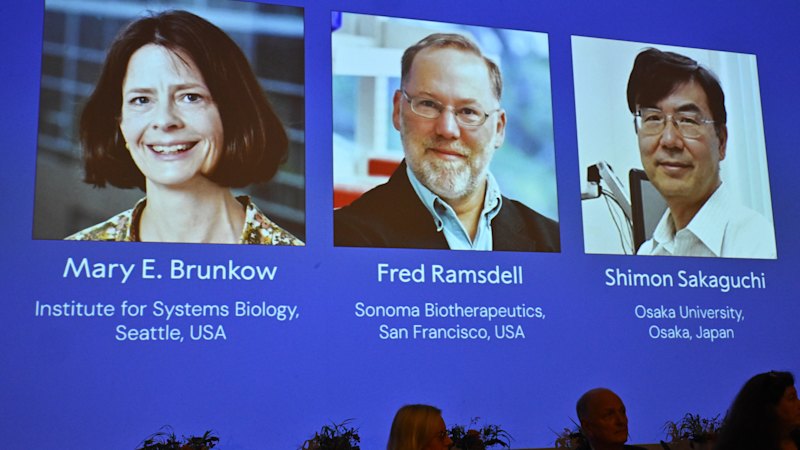
The 2025 Nobel Prize in Medicine has been awarded to American researchers Mary Brunkow and Fred Ramsdell, along with Shimon Sakaguchi from Japan, for their pioneering work in understanding how the immune system protects healthy cells. Their research has opened new avenues for potential treatments for autoimmune diseases and cancer.
Insights into Immune Tolerance
The prize recognizes advancements in the field of peripheral immune tolerance, a crucial mechanism that allows the immune system to combat pathogens while preventing attacks on the body’s own cells. Marie Wahren-Herlenius, a rheumatology professor at the Karolinska Institute, emphasized the significance of this research, stating, “This is how we keep our immune system under control so we can fight all imaginable microbes and still avoid autoimmune disease.”
Upon receiving the news, Sakaguchi expressed his gratitude, saying, “I feel it is a tremendous honour,” according to the Kyodo News Agency. The Nobel Assembly at the Karolinska Institute, which selects the winners, awards a prize sum of 11 million Swedish crowns (approximately $1.7 million) along with a gold medal presented by Sweden’s king.
Impact on Medical Research
Brunkow serves as a senior programme manager at the Institute for Systems Biology in Seattle, while Ramsdell is a scientific adviser at Sonoma Biotherapeutics in San Francisco. Sakaguchi holds a professorship at Osaka University in Japan. The Nobel Committee highlighted that their discoveries have laid the groundwork for a new research field, spurring the development of innovative treatments for conditions such as cancer and autoimmune diseases.
The laureates were instrumental in identifying regulatory T cells, which function as the immune system’s guardians, preventing immune cells from attacking the body. Following the announcement, Thomas Perlmann from the Karolinska Institute noted that while specific therapies have not yet received market approval, over 200 clinical trials involving regulatory T cells are currently ongoing.
Among the companies exploring these therapeutic approaches, Sonoma Biotherapeutics, co-founded by Ramsdell, is partly funded by the American pharmaceutical company Regeneron to develop treatments for inflammatory bowel disease. Quell Therapeutics has also partnered with AstraZeneca targeting similar conditions, while other biotech firms like Bayer’s BlueRock are investigating this promising avenue.
The Nobel Prizes were established by the will of Alfred Nobel, the inventor of dynamite, and have been awarded since 1901 for significant contributions to science, literature, and peace. The Economics Prize was added later, funded by Sweden’s central bank, the Riksbank. Winners are chosen by expert committees from various institutions, with awards presented in Stockholm, except for the Peace Prize, which is given in Oslo.
Notable past recipients of the Nobel Prize in Physiology or Medicine include Alexander Fleming, awarded in 1945 for the discovery of penicillin. In recent years, the prize has celebrated major breakthroughs, such as those leading to the development of COVID-19 vaccines. Last year, the award recognized Victor Ambros and Gary Ruvkun for their work on microRNA, which plays a vital role in cellular growth and differentiation.
Traditionally, the Nobel Prize in Medicine kicks off the annual Nobel announcements, which are regarded as the most prestigious awards in the fields of science, literature, peace, and economics. The awards culminate in ceremonies attended by the royal families of Sweden and Norway, followed by grand banquets on December 10, the anniversary of Alfred Nobel’s death.







